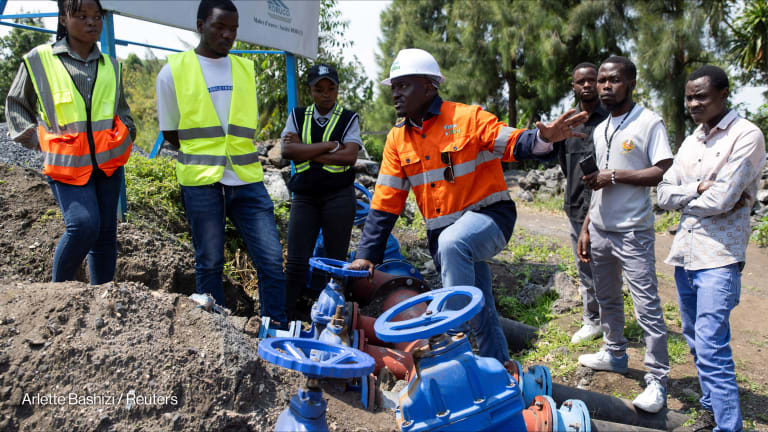How underfunded is UNRWA? Here’s what the data says
Despite the growing needs among its recipients, UNRWA, the lead organization for the rights and welfare of Palestinian refugees, has faced budget deficits in the last decade. We looked into the data to investigate the trend.
UNRWA, the United Nations agency for Palestinian refugees, is the lead organization for the promotion of the rights and welfare of close to 6 million registered Palestinian refugees in Jordan, Lebanon, Syria, and the occupied Palestinian territories. Established in 1949, UNRWA enjoys widespread support from the U.N. member states. But despite the growing needs of the refugees, the agency has been in a tight financial situation for a decade — long before the current war between Israel and Hamas broke out in early October. It has received enough money to cover core costs only one year in the last decade, although it has produced an overall surplus more often once emergency appeals are taken into account. In this analysis, we looked into UNRWA’s financial data between 2013 and 2022 to see funding trends — how much money does the agency need to fund its programs? Who were the top donors and how much money have they been giving? All the historical figures were converted to 2022 U.S. dollar constant prices, allowing for a year-on-year comparison with respect to changes in inflation rates. How is the agency funded? Many U.N. agencies, including UNRWA, rely massively on voluntary contributions from bilateral, regional, and multilateral donors rather than a fixed annual budget. This accounts for more than 90% of UNRWA’s total income. The remaining fraction comes from private sources — including foundations, individual donors, and the private sector — and money generated through collaborations with other U.N. agencies. The annual budget is based on the estimated total cost of core services and emergency humanitarian assistance needed for the year. Core services are the agency’s regular programs in areas that include education, health, and social services, and emergency appeals are intended for protracted and ongoing crises, such as the COVID-19 pandemic, natural calamities, and conflicts. According to UNRWA’s most recent budget report, spending on education made up more than half of its total budget for core services in 2020. Health ranked next, at 15% of the total, then support services at 13%. The remaining went to other sectors. The agency publishes its report on funding requirements at the beginning of each year. How much money is lacking? UNRWA receives money for both core services and emergency appeals. Looking only at the combined pledges for core services and emergency appeals, it would appear that UNRWA only faced a continued period of deficit a year after the United States pulled out its support in 2018. Although it also experienced a deficit in 2016 — with just $1.5 billion pledged out of the $1.7 billion required budget. Of the $1.3 billion required funding in 2019, just $1.1 billion, or 83.5%, was pledged. The deficit widened further the following year — of the almost $1.6 billion requirement, nearly $1.1 billion, or 67.1%, was pledged. Even after the U.S. resumed its support in 2021, UNRWA didn’t recover from the deficit. That year, just $1.3 billion was pledged out of the over $1.6 billion requirement. In 2022, the appealed budget was still around $1.6 billion, but the total incoming fund was just close to $1.2 billion. UNRWA’s 2023 budget is currently pegged at $1.6 billion in current prices. As of the end of April — the most recent updated report — just $431.2 million, or 26.5% has been pledged. From 2013 to 2015 and 2017 to 2018, the total pledges exceeded the required budget. However, this was only due to the surplus in the funding for emergency appeals. But if we look only at the funding for core services — which again is earmarked for UNRWA’s regular programs — the required budget was only met in 2018. For the rest of the 10-year period, the incoming money for core services fell short by around 6.6% to as high as 27.7%. The highest deficit in core budget was in 2020, when just $658.8 million was pledged against the $911.4 million required budget. Where is the money coming from? The U.S. was the top donor across all years except from 2018 to 2020 — when the government halted its financial support to UNRWA. The peak level of U.S. funding came in 2012, worth $505.3 million or 30.9% of the total. In 2022, it was worth $343.9 million. Germany was the second biggest donor in 2022, with $202.1 million. Then the European Union, with $114.2 million; Sweden, with $61 million; and Norway, with $34.2 million. Based on our analysis, we found out that across all years, more than half of UNRWA’s total budget came from just the top five donors in that year. Just four other donors made a top-five contribution in any of the 10 years: Japan, Saudi Arabia, the United Arab Emirates, and the United Kingdom. In 2022, 64.3% of the total amount pledged, worth $755.3 million, came from the top five donors. The U.S. alone accounted for 29.3% of the total in 2022. The highest rate was in 2013, when the top five donors — the U.S., EU, Saudi Arabia, U.K., and Sweden — made up 66.5%, worth a little over $1 billion, of the total amount pledged. The future of UNRWA UNRWA estimates that it would need somewhere between $1.8 billion and $2 billion annually between 2023 and 2028 to meet its strategic objectives. The target is ambitious, but the agency also laid out in its strategic plan report how underfunding could adversely affect its operations. In an article published last year, a U.N. official told Devex that UNRWA’s financial situation is comparable to a three-legged stool — composed of the U.S., Europe, and Arab states. This suggests that the political unpredictability among the bilateral donors, coupled with the U.N.’s complex financial structure, could potentially place UNRWA in a perpetual state of financial uncertainty. One prime example is when it faced a massive blow after the Trump administration decided to end its funding to the agency in 2018. Though that has been reversed by the Biden administration, UNRWA’s dilemma remains. In fact, the agency started 2022 with a $62 million debt. In 2023, carried-over debt amounted to $75 million. UNRWA Commissioner-General Philippe Lazzarini said in the same Devex interview that what the agency needs is predictable funding. This could be in the form of multiyear commitments. This model somehow offers continuity in programs — free from abrupt changes in the political climate. But until we finally find long-term solutions, this financial crisis will likely persist, and the lives of millions of Palestinian refugees will remain hanging by the thread. Try out Devex Pro Funding today with a free five-day trial, and explore funding opportunities from over 850 sources in addition to our analysis and news content.
UNRWA, the United Nations agency for Palestinian refugees, is the lead organization for the promotion of the rights and welfare of close to 6 million registered Palestinian refugees in Jordan, Lebanon, Syria, and the occupied Palestinian territories.
Established in 1949, UNRWA enjoys widespread support from the U.N. member states.
But despite the growing needs of the refugees, the agency has been in a tight financial situation for a decade — long before the current war between Israel and Hamas broke out in early October. It has received enough money to cover core costs only one year in the last decade, although it has produced an overall surplus more often once emergency appeals are taken into account.
This story is forDevex Promembers
Unlock this story now with a 15-day free trial of Devex Pro.
With a Devex Pro subscription you'll get access to deeper analysis and exclusive insights from our reporters and analysts.
Start my free trialRequest a group subscription Printing articles to share with others is a breach of our terms and conditions and copyright policy. Please use the sharing options on the left side of the article. Devex Pro members may share up to 10 articles per month using the Pro share tool ( ).
Miguel Tamonan is a Senior Development Analyst at Devex, where he analyzes data from public and private donors to produce content and special reports for Pro and Pro Funding readers. He has a bachelor’s degree in Political Science with a Major in International Relations from the Polytechnic University of the Philippines.








